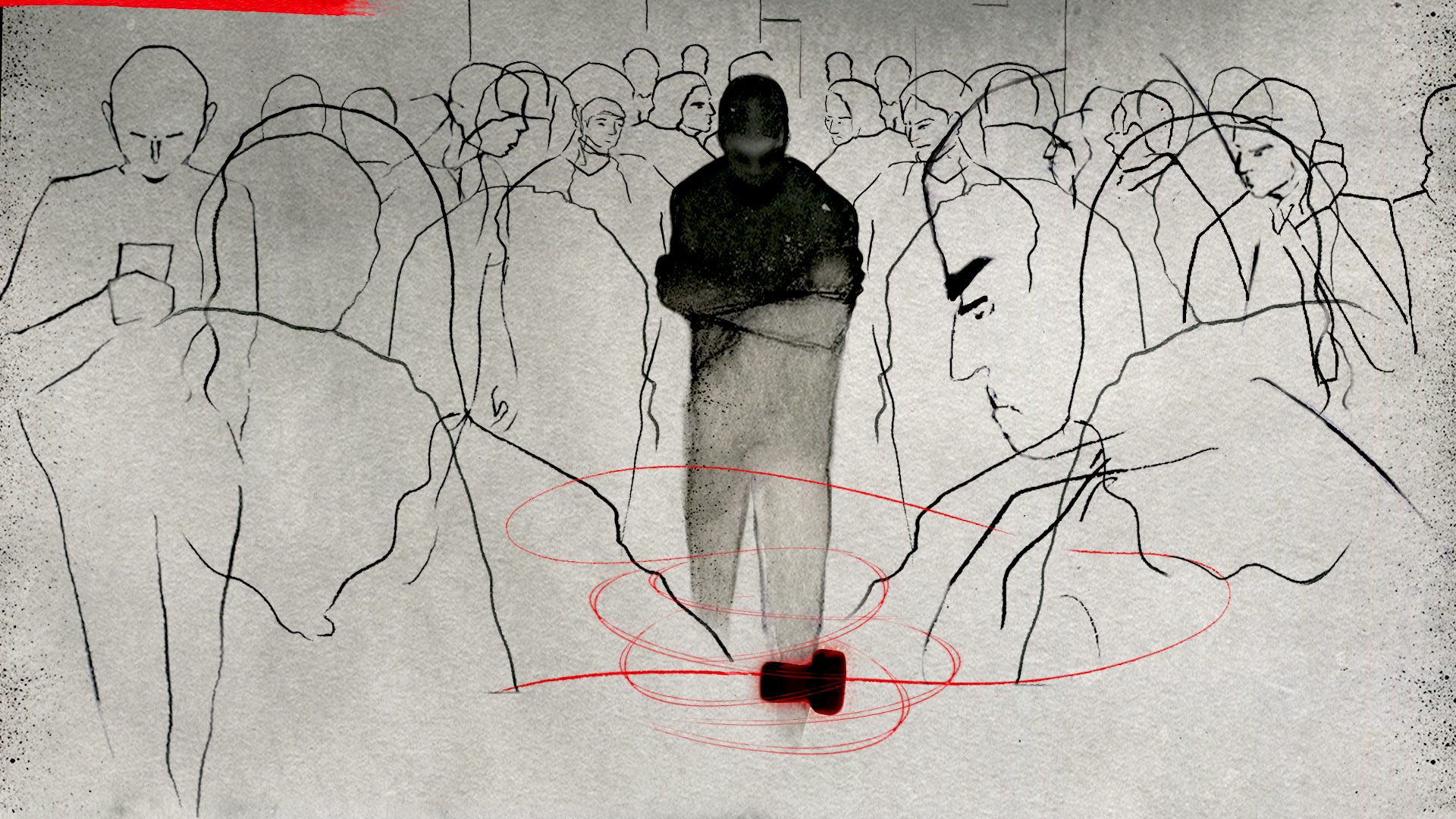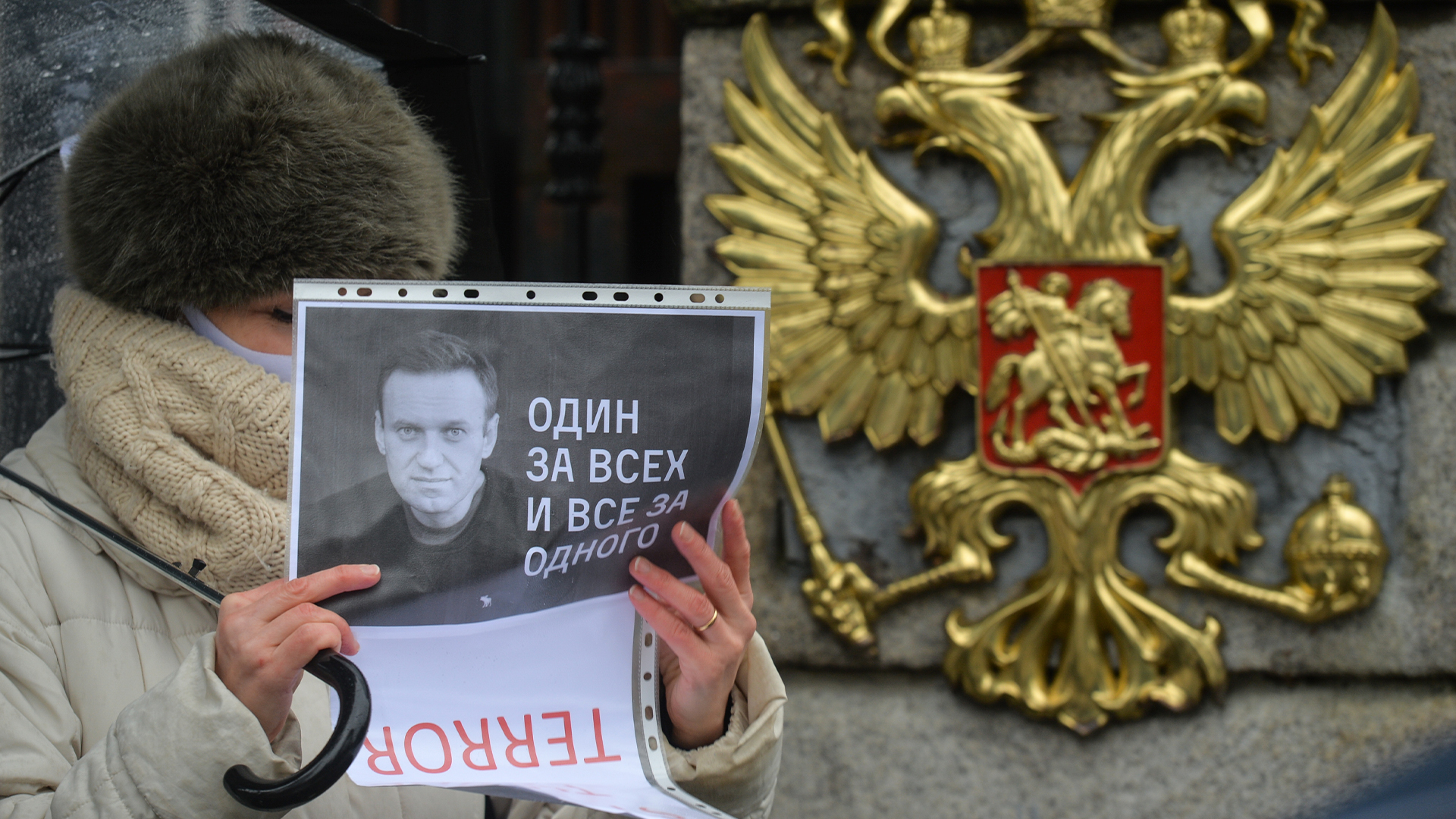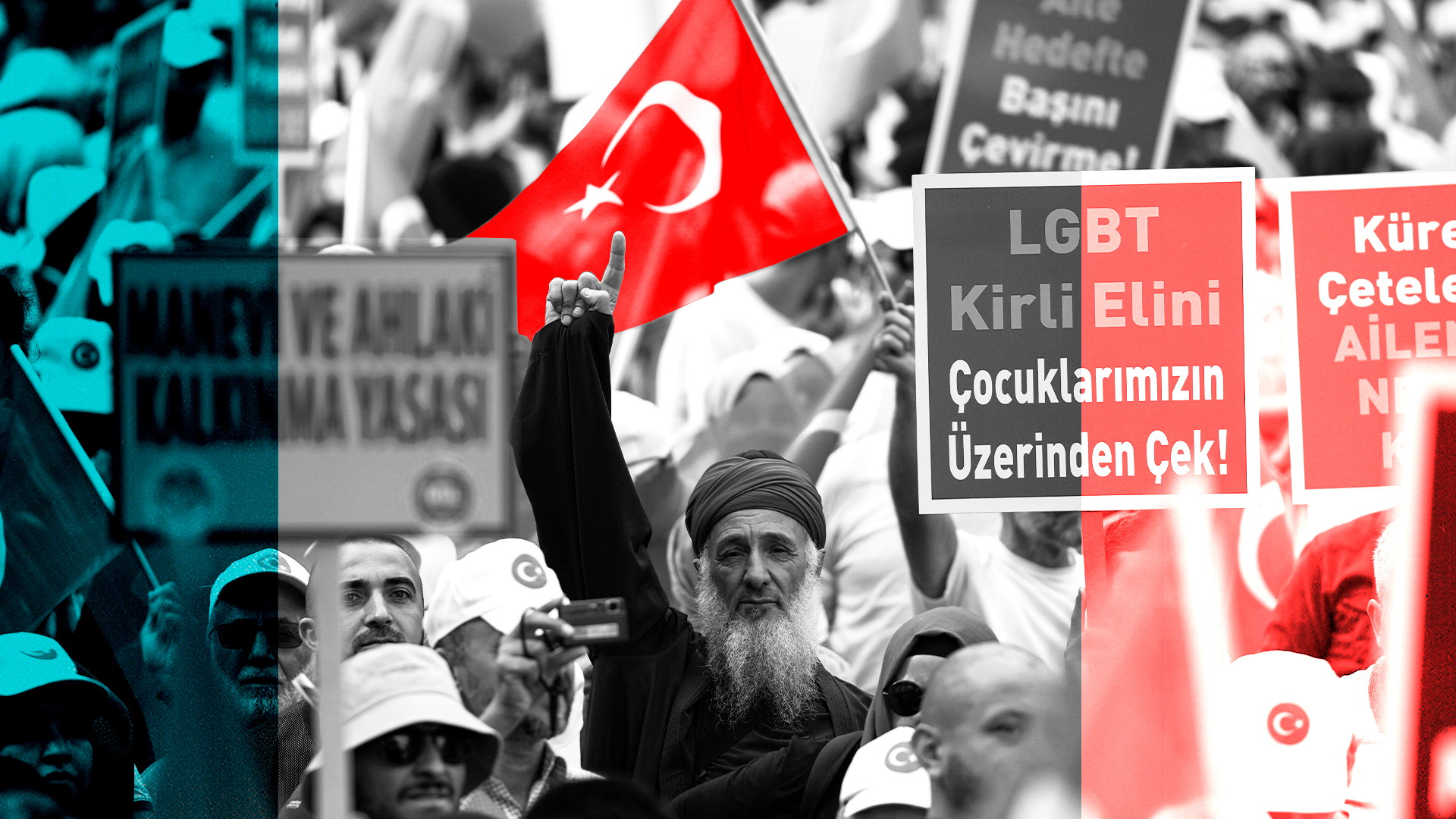International media did a double-take the night that a vegan cafe in Tbilisi, Georgia, was bombarded by sausages back in May. The warring parties of the food fight were Kiwi Cafe, a pacifist vegan eatery and Military Bar, a war-themed den of Georgian nationalism.
Tbilisi’s rendition of West Side Story has pitted hippies against nationalists, salad against steak. The story made international headlines: “sausage wielding extremists” had launched an attack on harmless herbivores.
But this correspondent went behind the front lines in an attempt to hear both sides of the sausage story, and was served a curious tale which mixes everything from ultra-nationalism to homophobia, along with a dash of Donald Trump. This culinary clash gives unexpected insight into a highly conservative society, trying to find its way in the modern world.
Piles of sandbags and painted outlines of soldiers create a trench-like feeling as you walk down the stairs to the dingy Military Bar. Camouflage netting and Georgian flags are draped along the walls. In this testosterone filled tavern, beer, meat and patriotism are on the menu.
My guide, Rezo, stands amidst the combat paraphernalia. He needs to explain himself. On May 29, he and around a dozen of his comrades abandoned their command post at the bar and set out into the night—all packing meat–determined to teach a lesson to their gastronomic and ideological nemesis.
“They came in, acting aggressively and interrupted a film screening,” recalls Giorgi Ianvarashvili, a representative of the Kiwi Cafe, a tiny vegan restaurant scrunched in the city’s handsomely aging Old Town. “One of them lit a cigarette. Our café is strictly non-smoking,” Ianvarashvili says.

Customers reported that the group had sausages draped around their neck, and were carrying slabs of meat on skewers. The ensuing brawl quickly spilled out of the cafe and into the street, but the sausage-wielding assailants fled before the police arrived.
The Kiwi Cafe received an outpouring of support both locally and internationally. American DJ Moby took to Twitter to congratulate the vegans for standing up to “nationalist thugs.” After a symbolic visit of support from the U.S. ambassador to Georgia Ian Kelly at Kiwi Café, the Military Bar made a ham-fisted attempt to counter allegations that they are right-wing nativists and posted their, unexpected, endorsement of Donald Trump on the bar’s Facebook page.
“We did not shove sausages into people’s mouths,” Rezo says, his deadpan manner and stocky military physique making the whole conversation seem even more absurd. He doesn’t deny attacking the Kiwi Cafe that night, but he is keen to set the record straight.
A friendly bartender offers Rezo a drink, and he settles in to tell the story of his bar and its beef with the vegans.
The Military Bar is known to be popular among ultranationalists, and its Facebook page is filled with photos and videos of uniformed and masked youths aggressively chanting and giving raised-fist salutes. It seemed like an open-and-shut case: the muscle-bound nationalists had launched an attack on the peace-loving vegans.
But Rezo claims that it was an associate of the Kiwi Cafe, that ignited the feud. He showed up to work on May 26, Georgian Independence Day, and found that the Military Bar had been, in his own words, “violated.”
“The sandbags were pulled down and sliced open,” he says. “The paintings and national symbols from the walls had been stomped over.”

Outraged at the intrusion, a post appeared on the bar’s Facebook page which read: “The parasites that damaged the bar’s façade are anti-nationalist elements and [deserve] a bullet in the head.”
Fortunately for all involved, a very different weapon of vengeance was chosen.
Rezo says they collected CCTV footage from nearby shops and identified the attacker: an anarchist who goes by the nickname Aaron. He was known to the staff of the Military Bar for his provocative online posts in which he ridiculed nationalism, the army and the flag.
“How can anyone hate the army? We fight and die for the country,” says Rezo, letting a hint of irritation slip through his otherwise monotone speech. “Even when I was a little kid, I was fascinated by the soldiers. Every time I’d see a man in uniform I wanted him just to lift me up and carry me around.”
At this point we are interrupted by some unexpected customers. Three Israeli tourists in kippahs and white slacks walk in. Rezo remains expressionless, but his eyes flicker with that familiar excitement that we Georgians get when we see foreign guests and are overcome by an urge to drown them in drink and food. “They are Arabs right?” Rezo asks the bartender, who shrugs his shoulders.
“Quite the opposite,” I interject to avert the faux pas in the making. The Israelis point at the guns on the wall and give a thumbs-up. Rezo summons something close to a smile and invites the visitors to sit down, treating them more as house guests than as customers. He leaves them in the care of the bartender who offers them a beer on the house and later, a lesson in Georgian history delivered in effortful English.

Rezo returns to his story. He believed that their assailant, Aaron, was a bartender at the Kiwi Café. However during a TV interview, a member of staff from the Kiwi Cafe acknowledged that while Aaron was a regular customer, he had never worked for the cafe.
My attempts to reach the proverbial Aaron and hear his side of the story failed, however Rezo says that he managed to track him down and gave him a stern talking-to about the inviolability of private property and the national flag. “I told him that people died for the flag, that when a flag bearer would fall, another soldier would pick up and carry the flag,” he says.
After the Military Bar’s retaliatory strike provoked international outcry, they have made some clumsy attempts to redeem themselves. The owner Nika Kavelashvili came out to say that the bar is open to anyone and that they even had three homosexual customers once: “Now would we have allowed homosexuals in if we held neo-Nazi ideas?”
Rezo too seems puzzled by those who harbour fascist views. “To be frank, I am personally not into that fascism thing at all,” he says flatly.
To disabuse me of any wrong ideas I may have, Rezo tells me about how the bar got started. “The city needed a bar like this because most cafes in the center are LGBT,” he says. A tenuous claim to make in country which is fervently Christian and homophobic. In Rezo’s thrifty vocabulary, the acronym LGBT is a catch-all term for anyone, who is liberal, hipster or generally looks unconventional.
The warring cafes are both small, shoestring affairs catering to subculture customer bases, but the similarities end there. Design-wise alone they could not be any more different. Daylight burst through the large, single-pane windows at Kiwi Café’s former premises, which has since been abandoned following the sausages scandal. The landlady complained about noise and men in “flower-print shorts,” while the neighbours were worried it would attract further trouble, Kiwi cafe’s management said. The cafe has since migrated to a new premises.
Ebullient, scrawny youths with fluorescent faux hawks and tattoos make up much of the café’s clientele and the egalitarian management system. “There are no bosses and no employees here, no distinction between Georgians or foreigners. We are all here because we believe in what we do,” says the cafe’s Ianvarashvili, who has a lobe-stretching earring and elaborate tattoos to match his subculture philosophy.

Rezo, by contrast, says he is proud that he and his comrades are taking back the city’s downtown from the gay/vegan/hipster/you-name-it crowd. On more than one occasion he digresses to talk about his views on homosexuality.
“You can fuck in the ass if you must, but you should not flaunt that in public and should not insult national values,” he said.
With vicarious pride he pontificates about his knightly ancestors. Stories of their patriotic feats, real or romanticized, have been passed down through generations in music, tales and in toasts at the dinner table. For many, these stories and Georgia’s rich culinary tradition are the essential components of the country’s machismo national identity.
Rezo sees himself as a “true” Georgian by this interpretation of national identity. For young people looking to rebel, these social conventions have also proved to be a useful place to start. The Georgian capital has long had a lively scene of creative, bohemians youth united by art, music and the desire to shed the straightjacket of tradition. Those who challenge well-established conventions are often singled out for undermining “Georgian-ness.”

Intolerance toward diversity in Georgia can perhaps be attributed to fears that the small country, both young and ancient at the same time, is being diluted by globalization. Since it gained its independence from the USSR twenty-five years ago, dogmatism has been on the rise in Georgia in everything from religion to social norms and food. But this tidal pull of conservatism is confronted by a no less powerful urge to explore and innovate.
Tbilisi’s now infamous foodfight is a symptom of this cultural friction. For young progressive Georgians and much of the expat community, Kiwi Café offers some much-desired diversity. But the self-appointed guardians of Georgian values view it as a place of apostasy, not so much for its menu, but because of its nihilist vibe.
“They are free to do their LGBT things at home,” says Rezo, getting back on his gay soapbox. “But they have no business in mocking national symbols and the church.”
He claims that they initially went to Kiwi Café intending to make peace and brought along some meaty meals from the bar’s kitchen as a peace offering. “But they chose to start a fight,” he says. When I point out that a sausage is a strange substitute for an olive branch when visiting a vegan establishment, he disagrees: “They did not have to eat it.”

The great sausage war may have been a blessing in disguise for both sides of Georgia’s cultural and dietary divide. The Military Bar has since scaled back on its nationalist social media posts and instead focuses on promoting its football screenings and beer-drinking contests. Many visitors, curious to check out the supposed taproom of bigotry, were surprised to find a welcoming and fun atmosphere at odds with the place’s gritty reputation. Even a few less-than-straight customers have since emerged from the pub claiming to have become besties with some of the bar’s god-and-gun-loving clientele.
The Military Bar recently announced plans to renew its menu in 2017. In a Facebook post, the bar’s management wrote that the updated carte de jour will now include “fries, steak burgers, grilled kebabs and a few vegan dishes,” followed by a series of a smiling and winking emojis.
Before I leave, I ask Rezo if I can take a couple of pictures of the bar. With the most phlegmatic display of vanity possible, he says I can photograph his muscular silhouette from behind, with the bar’s entrance as a backdrop. After posing with his muscles flexed, Rezo shows me out.
“I trust that you will write the truth about us.”
This material was produced with the support of Project Objective and NIRAS.










